#SecurityScan 92: Bangladesh Crisis & lessons for India
16 Aug 2024 12:52:47
This article is a summary of important events that have taken place in last one week affecting, India's national security.
1. From Hope to Despair: Testing Times for Democracy in Bangladesh
A Shocking Collapse and Its Impact
On August 5, under a 45-minute ultimatum from the Bangladeshi Army, Prime Minister Sheikh Hasina left Bangladesh for India. Bangladesh Army Chief Waker-uz-Zaman announced the establishment of an interim government.
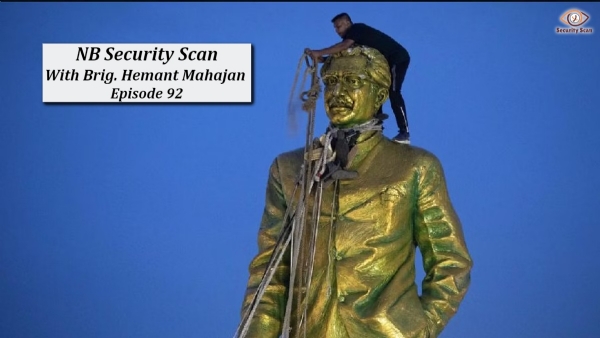
The sudden collapse of Hasina's government is both shocking and unfortunate. Concerns about the rise of radical elements in Bangladesh have grown, exacerbated by the violent aftermath of her resignation. Her son, Sajeeb Wazed Joy, said that Hasina would not return to politics, lamenting that despite her efforts to transform Bangladesh into a rising Asian economy, the current turmoil had dashed those hopes.
The Origins and Escalation of Student Protests
The political unrest, initially framed as a 'students' movement,' began in July 2024 with demands to abolish quotas in government jobs. A Supreme Court ruling on July 21 reduced quotas for families of freedom fighters from 30% to 5%, reallocating positions based on merit and including ethnic minorities, transgender individuals, and people with disabilities. Despite this, protests continued, with calls for Hasina's resignation and escalating violence that resulted in over 300 deaths.
The Role of Radical Elements
The agitation's dominance by the Razakar narrative foreshadowed the violence of August 5, when statues of Sheikh Mujibur Rahman were destroyed, and significant landmarks, including the Prime Minister’s residence and the Indira Gandhi Cultural Centre, were vandalized. Hasina’s poignant question about the resentment against freedom fighters was met with destructive actions.
The Influence of Jamaat-e-Islami and Islami Chhatra Shibir
The radical outfit Jamaat-e-Islami Bangladesh (JeI) and its student wing, Islami Chhatra Shibir (ICS), played a significant role in the unrest. The Bangladesh government banned Jamaat-ICS on August 1, citing their involvement in recent terrorist activities. Jamaat has a history of collaborating with the Pakistani army during the Liberation War and has always opposed the Awami League. The ban was a direct attack on a volatile entity, leading to intensified protests and further violence.
Unrest and Chaos in Dhaka
Protesters stormed the Prime Minister's residence, looting everything from food to furniture in a festive procession through the streets of Dhaka. This chaotic scene is part of a disturbing trend in South Asia where popular unrest dictates political outcomes, similar to events in Sri Lanka, Afghanistan, and Pakistan.
The Role of Opposition and Civil Society
The political opposition in Bangladesh, supported by civil society groups, capitalized on public discontent to bring about change. The student movement for quota reform, initially peaceful, was hijacked by opposition parties, leading to widespread violence and protests.
Despite attempts to address the issue, the government's actions were too little too late, and the quota reform movement gained momentum.
Violent Confrontations and Political Fallout
The involvement of the Chhatra League, the student wing of Hasina's Awami League, in violent clashes with protesters escalated tensions. As violence engulfed Dhaka, the opposition, particularly the Chhatra Shibir of Jamaat-e-Islami, joined the fray, leading to widespread destruction and arson.
Government Missteps
The Hasina government's refusal to engage in dialogue with protest leaders, coupled with its heavy-handed response, only inflamed passions. Labeling students as "Razakars" and terrorists exacerbated the situation. Even after the death toll surpassed 200, the government failed to acknowledge the severity of the crisis.
The Army's Role and Political Transition
As the situation deteriorated, social media campaigns urged the army to support the people. Eventually, the army gave Hasina 45 minutes to resign and leave the country. General Waker-Uz-Zaman, a relative of Hasina, announced plans for a civilian interim government, although the timeline remains unclear.
International Reactions
The U.S. and the EU expressed approval of the protestors' lawful actions and the army's restraint, signaling tacit support for the transition. Neither China nor Pakistan commented on the developments, but both have strong ties with opposition parties and the military in Bangladesh.
A History of Army Interventions
Bangladesh has a history of military interventions in politics. After the assassination of Sheikh Mujibur Rahman in 1975, Major General Ziaur Rahman seized power. His regime was followed by Lieutenant General Hussain Muhammad Ershad’s coup in 1982. The current situation echoes these past events, with the army likely to set up an interim government, possibly leading to martial law or a compliant civilian cabinet.
The Rise of the Bangladesh Nationalist Party
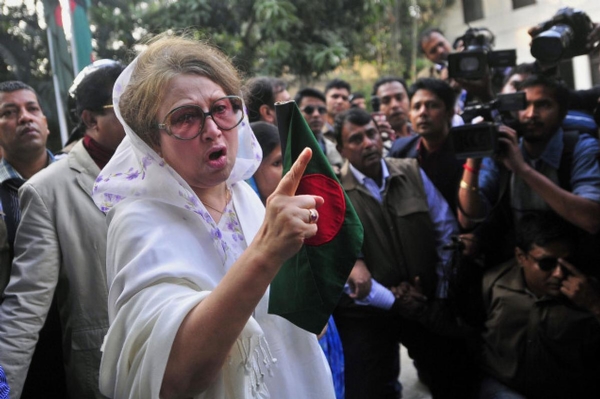
In the wake of Hasina’s resignation, President Mohammed Shahabuddin ordered the release of opposition leader Khaleda Zia. The Bangladesh Nationalist Party (BNP), aligned with Jamaat, has been instrumental in the unrest. Tarique Rahman, Khaleda Zia’s exiled son, called on pro-democracy supporters to join the protests, highlighting the BNP’s significant role in the turmoil.
The Path Forward: Democracy in Jeopardy
The future of democracy in Bangladesh appears bleak. The pretext of removing a 'corrupt' government through student protests will likely give way to the dominance of the army and Jamaat-BNP. The current turmoil, driven by radical elements and deep societal divisions, suggests that a functional democracy remains a distant dream for Bangladesh.
Turbulent Times, With Uncertain Outcome
Bangladesh's descent from hope to despair tests the resilience of its democracy. The current crisis, marked by violence and political upheaval, underscores the challenges ahead. The world watches as Bangladesh navigates these turbulent times, with the outcome uncertain.
2. The Bangladesh Crisis: A Test for Indian Diplomacy
Turbulent Times ahead
Bangladesh is currently experiencing turbulence, and its descent into anarchy poses serious implications for India. As a neighbor with a complex history and shared borders, India's relationship with Bangladesh is deeply intertwined. The religious composition and affinity of Bangladesh to the Islamic world add further dimensions to this relationship. Shared water resources demand high levels of cooperation.
Despite India’s role in Bangladesh’s independence, the relationship remains complicated. Bangladesh is surrounded on three sides by India, with a porous border.
The Sheikh Hasina alternative
The recent political upheaval in Bangladesh raises important questions about India's support for Sheikh Hasina. Sheikh Khaleda Zia’s BNP was not a viable alternative due to its anti-India stance and ties to radical Islamic elements.
Dependence and Reciprocity
For India, Hasina was a reliable partner against cross-border infiltration and Jihadi threats. In return, India handed over several wanted individuals to her government.
A more flexible strategy could have brought moderate opposition elements into Hasina’s fold, potentially easing tensions. Hasina’s hardline strategies may have contributed to the current crisis.
US Influence and Counterfactuals
The United States had issued veiled threats to Hasina, urging her to hand over the administration to an interim government for overseeing elections. Ignoring these warnings, Hasina pressed on with elections boycotted by the opposition.
Historical Parallels and Current Dynamics
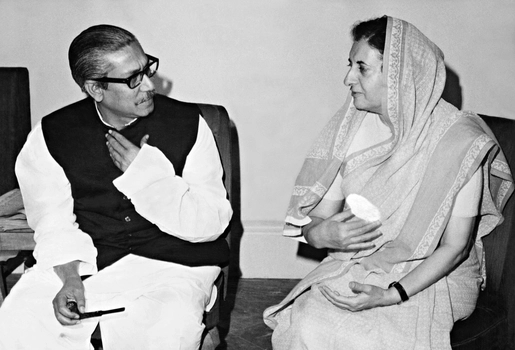
The current crisis evokes memories of the political turmoil of August 15, 1975, when Sheikh Mujibur Rahman was assassinated while Mrs Indira Gandhi was in power in India. During that time, Indira’s alliance with the Soviet Union and her defiance against the United States’ interests played a significant role. Similarly, today’s geopolitical dynamics, including India's leanings towards Russia, could invite attempts to destabilize the country.
Implications for Indian Diplomacy
The descent into anarchy in Bangladesh has serious implications for India. Political parties in India recognize these risks and have pledged their support to the government. Indian government must navigate these challenges with diplomatic deftness, balancing its ambitions and strategic alignments carefully.
Navigating a Complex Geopolitical Landscape
India has always been a playground for big powers. The current geopolitical landscape is neither bipolar nor fully multipolar. Leaning too heavily towards any one power could invite complications reminiscent of the 1970s. The Indian government will need to play its cards carefully, to focus on immediate diplomatic challenges.
Testing Times Ahead
The Bangladesh crisis presents testing times not only for Bangladesh but also for India. The Indian government’s ability to handle this crisis with skilful diplomacy will be crucial in maintaining regional stability and safeguarding India's interests.
3. Bangladesh 'Coup' Straight Out of CIA Playbook: Why India Should Be More Watchful and Alert
Strategic-Security Challenges for India
The political upheaval in Bangladesh following Sheikh Hasina's resignation presents a significant strategic-security challenge for India, particularly for West Bengal and the sensitive Northeastern regions. This change also poses a strategic disadvantage for the United States, with Pakistan and China poised to increase their influence in Dhaka.
Western Diplomacy's Hypocrisy
There is an inherent hypocrisy in Western diplomacy, especially from the United States, regarding democracy. Historically, the U.S. has been comfortable dealing with autocrats and dictators while often expressing disdain for India's democratic processes. This contradiction is evident in their interactions with allies from non-European origins, where discussions frequently focus on democracy, free elections, and human rights.
The Case of Egypt, Saudi
Frustrated by American pressure on democratic reforms, then Egyptian President Hosni Mubarak retorted that such changes would lead to an Islamist takeover. His fears materialized post-Arab Spring, with his replacement by an Islamist regime backed by the Muslim Brotherhood. Similar concerns are echoed by Saudi leaders, who warn that excessive American pressure could result in Taliban-like theocracies.
The Current Crisis in Bangladesh
The political crisis in Bangladesh mirrors American fixation on democracy. Sheikh Hasina, who recently resigned, was seen as the last bulwark against jihadism and hard-core Islamism. Her departure has exacerbated fears among minorities, particularly Hindus, who face increased violence and persecution. The vandalism of an ISKCON temple ,attacks on Hindus are examples of this escalating hostility.
Following the CIA Playbook
The current 'coup' in Bangladesh appears to follow a familiar pattern seen in past regime changes orchestrated by the CIA in South America and many other places. Typically, the process begins with questioning election results, leading to protests fuelled by internal and external elements, ultimately resulting in a coup celebrated as a liberation by manipulated local populations.
The Judicial Verdict's Role
Ironically, the controversy in Bangladesh was not of Sheikh Hasina's making but stemmed from a judicial verdict. While the court remains intact, Hasina has been displaced, illustrating the effectiveness of the CIA playbook.
Implications for the United States
Displacing Sheikh Hasina brings chaos and anarchy . The U.S. may inadvertently strengthen Pakistan's ISI and, consequently, China's influence in Bangladesh, especially considering Xi Jinping's discontent with Hasina's India-first policy.
Strategic Concerns for India
Post-Hasina Bangladesh poses a significant strategic-security challenge for India. The potential alignment of Pakistan and China in Dhaka could create regional instability. India's current government, already viewed unfavourably by the West, must be vigilant against similar destabilization tactics. The recent farmers' protest, though contained, exemplifies how internal dissent can be leveraged by external forces.
A Losing Proposition for the U.S.
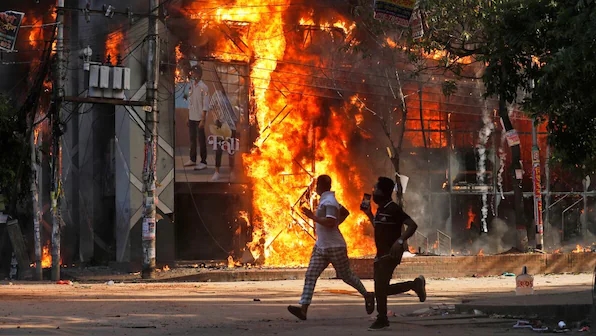
The U.S. faces a losing proposition with its current approach, particularly as China continues to challenge American authority. The Bangladesh crisis should serve as a wake-up call for India, highlighting the need for heightened vigilance and preparedness against external influences seeking to exploit internal unrest.
The political turmoil in Bangladesh underscores the complexities of international diplomacy and strategic security. For India, the crisis necessitates increased alertness and proactive measures to safeguard its regional interests amidst growing external threats.
4. Bangladesh Crisis: The Influence of China's Invisible Hand
Rising Chinese Engagement with Extremism
In recent times, China’s involvement with Islamic extremism has increased. This shift has seen China move from engaging solely with state actors to patronizing extremist non-state terrorist groups. This strategic move has broad implications for Bharat.
Strained Relations Between China and Sheikh Hasina
A month before her resignation, relations between China and Bangladesh's Prime Minister Sheikh Hasina were deteriorating. Reports suggest that Hasina received a cold reception in China, cutting her visit short. This may indicate that China had intelligence on an impending coup against her and was directly involved in orchestrating it.
Political Turmoil in Bangladesh
Following these events, Sheikh Hasina fled Dhaka to India, as a mob breached security to enter her house. The Bangladesh military has since announced an interim government. The army chief sided with foreign powers against their own leaders.
Historical Parallels and Current Events
The history of Bengal is replete with examples of army chiefs aligning with foreign powers against their country. This raises questions about whether Bangladesh Army Chief General Waker-Uz-Zaman is siding with China.
China's Strategic Moves in South Asia
China’s direct intervention in Bangladesh, in collaboration with Pakistan’s ISI and other elements of the Muslim Brotherhood, is a calculated move. China’s engagement in the region began with Pakistan to counterbalance India. Pakistan provided China access to the Indian Ocean from the north.
Escalation of Chinese Support for Extremist Groups
China’s support for extremist groups has expanded significantly. This includes cooperation with Pakistan-sponsored terrorists in Kashmir and recognizing the Taliban to suppress ISIS-K and armed East Turkistan rebels. This shift from engaging state actors to supporting terrorist groups marks a significant step in China’s strategy.
Implications for Bangladesh
Sheikh Hasina, daughter of Bangladesh’s founding father Mujib ur Rahman, was unpopular with Islamists due to her stance against groups like Jamaat-e-Islami Bangladesh (Jamaat) and its student wing, Chhatrashibir. These groups have strong ties with the Muslim Brotherhood and have infiltrated the opposition Bangladesh Nationalist Party (BNP) and possibly the armed forces.
Geopolitical Ramifications for India
China, mistrustful of Hasina, prefers a puppet government in Dhaka that would provide strategic advantages against India. This political instability in Bangladesh, combined with ongoing conflicts in Myanmar, threatens India’s regional initiatives like BIMSTEC and the IMEC.
China's Broader Strategy
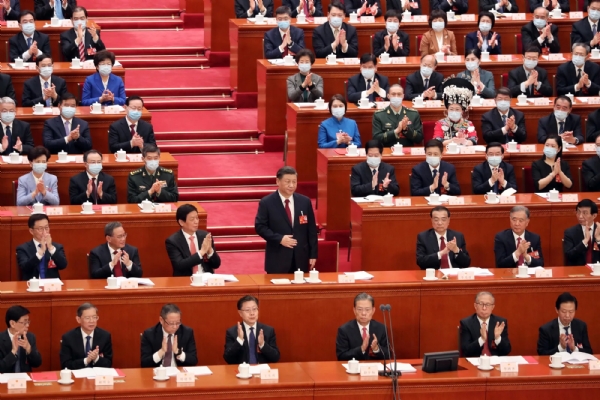
China’s engagement with Muslim organizations globally, initially a tactic to deflect criticism of its Uyghur policies, has evolved into alliances with extremist. This strategy aims to disrupt democracies and accelerate geopolitical shifts. However, China must understand that the Muslim Brotherhood and similar groups can be unpredictable.
5. Tensions Run High in Bangladesh: Why Bharat Must
Engage with Dhaka
The End of an Era
Sheikh Hasina's sudden resignation and flight from Bangladesh marks a pivotal moment in the country's history. The vivid image of a protester attacking the statue of Bangabandhu, Hasina's father, symbolizes the end of an era in which she sought to preserve his legacy.
Implications for India
Stability in Bangladesh is crucial for India's security, particularly in the Northeast. India must prepare for a potential influx of Hindu refugees and beleaguered Awami League supporters. Over the past decade, Prime Minister Narendra Modi's government has successfully built friendly ties with Bangladesh, which must continue.
The Path Forward for India
India should engage all political forces in Dhaka and maintain strong relations with the Bangladeshi army. Strengthening developmental partnerships and enhancing people-to-people linkages will serve India well, regardless of the composition of the new government in Bangladesh.
The political turmoil in Bangladesh underscores the importance of India's engagement and vigilance in the region. By nurturing ties with all stakeholders in Dhaka, India can help ensure stability and security in its immediate neighbourhood.
6. India in a Hostile Neighbourhood: The Way Ahead for Bharat
Potential Hostility from Bangladesh
If opposition groups like Jamaat-e-Islami and the Bangladesh National Party (BNP) come to power, India's relationship with Bangladesh could deteriorate, adding another hostile neighbor to an already tense South Asian region.
Existing Antagonisms
The possibility of an unfriendly regime in Bangladesh creates a scenario where India could be surrounded by antagonistic neighbours on all sides.
Anti-Secular Forces in Bangladesh
The Jamaat-e-Islami and BNP, the main political opposition to Sheikh Hasina, advocate for an Islamic identity for Bangladesh, contrary to its secular foundation. Ziaur Rehman, the BNP founder, removed the word "secular" from Bangladesh's constitution, reflecting this ideological stance. Both groups have historically been anti-secular and have significant support, mobilizing the population and receiving funding from Pakistan's ISI.
The US Factor
The involvement of the US in Bangladesh's political landscape raises questions. Sheikh Hasina has accused the US of meddling in Bangladesh's affairs, citing the Biden administration's vocal opposition to her government. The US has a history of effecting regime changes to serve its strategic interests, often under the guise of promoting democracy. In Bangladesh, the US aims to counter China's influence in the Indo-Pacific and pressure India to check its rapid growth.
Strengthening Strategic Partnerships
Given the potential hostility on its borders, India must explore ways to strengthen comprehensive strategic partnerships and intensify trade with its extended neighborhood, including Southeast Asia, Indo-Pacific powers, and the Middle East. Historically, India has been a strong economic and cultural capital, leveraging its geographical location and extensive trade by sea to secure prosperity.
Reviving Historical Strengths
India is now on a path to modernize in all sectors and grow them to meet global demands. India's non-expansionist identity and idealistic integrity make it a friend to most of the world, particularly the Global South.
Expanding Trade and Strategic Relationships
Opening up trading channels through the seas, deepening relationships with partner countries, exporting military strength to counter expansionist forces, and disseminating ancient knowledge can help India counter the hostility from its neighbors. By enhancing trade and strategic relationships, India can reinforce its position and ensure stability in the region.
Conclusion
The political upheaval in Bangladesh underscores the need for India to remain vigilant and proactive. By engaging with all political forces in Dhaka, nurturing ties with the Bangladeshi army, and strengthening strategic partnerships, India can navigate the challenges posed by a potentially hostile neighbourhood. The path forward involves leveraging historical strengths and expanding trade and diplomatic relationships to secure India's interests in an increasingly volatile region.
--